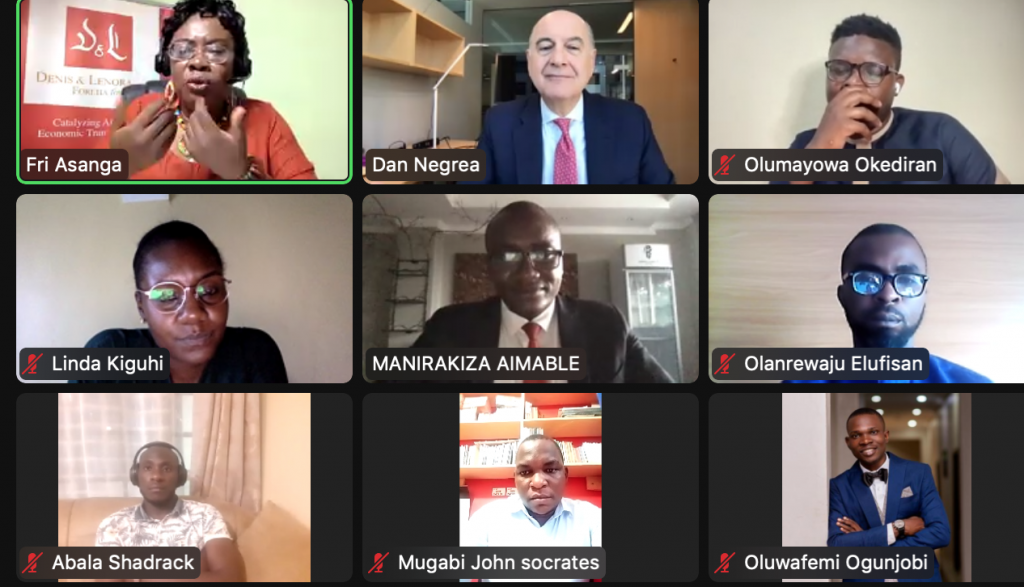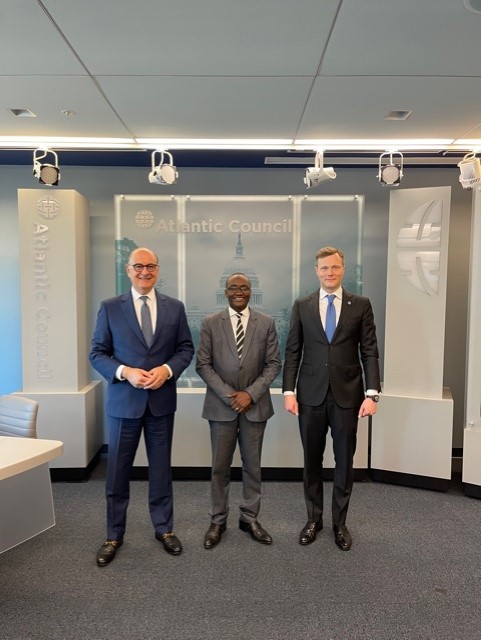

The Atlantic Council’s Freedom and Prosperity Project, on January 11, 2022, in collaboration with the Centre for Development and Enterprises Great Lakes, Burundi, hosts the third in a series of virtual workshops on strengthening economic freedom, rule of law, and representative government in different regions across the world.
This workshop focuses on Africa, and convenes a small group of former senior officials, civil society leaders, and scholars from across the region to discuss the credibility of the project’s message and how to communicate the message to stakeholders in the region.
Here are the key takeaways:
Why the message is needed
Many Africans feel they are not free. Repressive governments across the continent stifle individual freedom and, in many cases, deny citizens their most basic civil liberties. Conversely, African elites enjoy tremendous wealth from resource extraction and go to great lengths to defend a status quo that excludes the vast majority from meaningful participation in economic and civil life.
Poverty remains endemic in many parts of Africa. Without greater economic freedom, this is unlikely to change. Poor Africans need to be empowered to start businesses, trade freely, and search for work in an open and competitive labor market. Without greater access to economic opportunity, millions of people will stay mired in subsistence farming.
Many Africans lack the political voice to fight for greater economic freedom. Ruling politicians routinely silence and discredit opposition figures that call for political and economic liberalization. The rule of law is weak, and ruling regimes can easily punish dissenters. When elections do occur, they are often fraudulent, allowing leaders to maintain their grip on power under the guise of democracy. Civil society on the continent is often too weak to meaningfully hold politicians accountable or widely promote alternative policy measures.
The situation has been made worse by COVID-19. Repressive governments have used the crisis to insert themselves more forcefully into the lives of their citizens. In Nigeria, for example, the government routinely blocks social media posts, and the police are given free rein, in many cases terrorizing and extorting the citizenry. Likewise, restrictive economic policies have become even harsher through mandatory lockdowns and increased surveillance.
What can be done
Civil society must work hand-in-hand with citizens to promote the message of greater economic and political freedom. For this to be possible, young people across the continent will have to support the message of freedom and look to form partnerships with civil society groups that advocate liberal policies. As things currently stand, civil society is too underdeveloped to reach a critical mass of people or seriously affect government policy.
A first step in this process is to rally support for the message of freedom by promoting it on social media. Young people across the continent are technologically savvy and respond well to infographics and audio-visual messages. These messages should be educational and convince viewers of the personal benefits that greater freedoms provide.
Activists and organizers should also seek to revive and bolster programs about freedom at universities across the African continent. For instance, the organization Students for Liberty promotes the ideas of freedom among university students, and could serve as a model for similar programs to introduce younger generations to the benefits of a freer society.
Framing the message
For the message of economic and political freedom to resonate in the region, people must come to identify with the personal benefits that accompany greater freedoms. Many voters do not fully understand the effect of free-market policies and choose not to support them. Greater freedoms should be presented as policies that make starting a business easier or reduce the amount citizens pay in taxes.
Moreover, any appeal to Africans should be framed in light of existing African culture and values, not as an import from Europe or the United States. For instance, there is a traditional saying that “a chief is a chief by the will of the people.” Likewise, in Nigeria, classical government involved the people directly giving their opinions to the king. The roots of representative government can be found in indigenous African political traditions, and these links should be emphasized in messaging campaigns.
Success stories on the African continent should also be highlighted. Botswana presents perhaps the best example of development on the continent. When it became independent, Botswana was among the poorest countries in the world and the poorest in Africa. The country’s first president, Seretse Khama, set about transforming the country through free-market policies, strong anti-corruption measures, and a commitment to elections and the rule of law. Additionally, Khama established an independent judiciary and maintained the professionalism of the civil service, endowing the country with strong institutions that have held up over time. In the years following Khama’s reforms, Botswana has seen exceptional growth and now ranks among the countries in Africa with the highest GDP per capita.
Finally, messaging must accommodate the current political climate. Governments in the region may fear a loss of control from disruptive political messaging. Messages in support of freedom should be expressed in such a way that governments do not feel threatened; rather, governments must be reassured that by allowing greater freedom, their people will become more satisfied with their rule.
For media inquiries, please contact press@atlanticcouncil.org.
Driven by our mission of “shaping the global future together,” the Atlantic Council is a nonpartisan organization that galvanizes US leadership and engagement in the world, in partnership with allies and partners, to shape solutions to global challenges.
